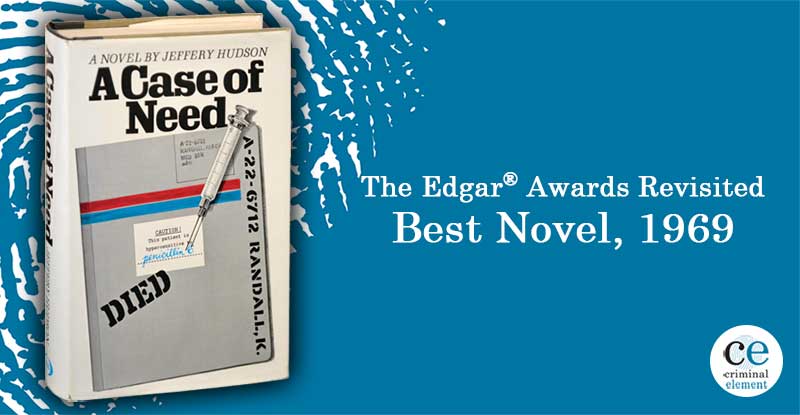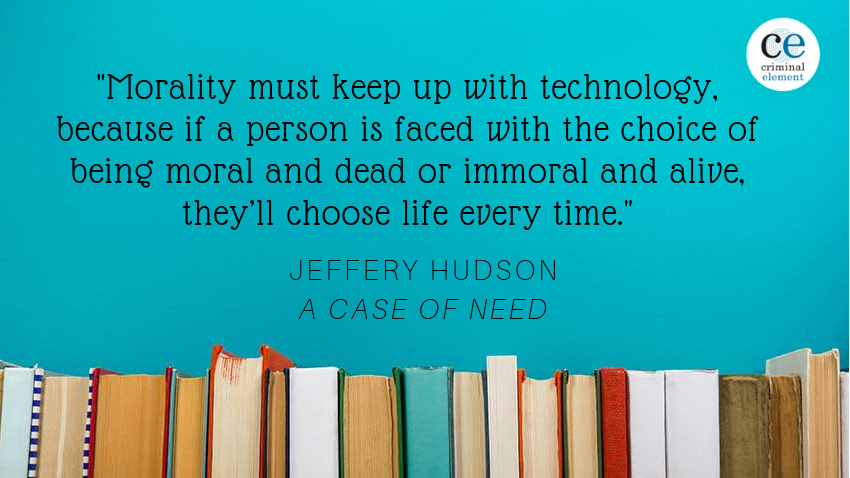The Edgar Awards Revisited: A Case of Need by Jeffery Hudson (Best Novel; 1969)
By Pritpaul Bains
April 19, 2019Michael Crichton, writing as Jeffery Hudson, won the 1969 Edgar Award for Best novel for his medical thriller, A Case of Need.

[An abortion] is not a particularly difficult operation—a well-trained nurse can do it with no problem. There’s only one small catch.
It’s illegal.
This is the driving thrust of Michael Crichton‘s (writing here as Jeffery Hudson, for reasons we’ll get into later) A Case of Need, a potent literary cocktail of hospital drama, abortion rights, and the unyielding hold of superficial morality on a hypocritical society.
While most fans will almost certainly associate Crichton with the massive success of his film adaptations (Jurassic Park and Westworld come immediately to mind) and his impact on modern television as the creator of ER, he first cut his teeth in print thrillers via a trio of novels he penned under the pseudonym John Lange. Crichton was under no illusions as to the rough nature of his early work—he self-deprecatingly referred to his Lange novels as a series of “potboiler[s]” that “any idiot should be able to write”, and went so far as to describe his second novel as “no good”—but he nevertheless enjoyed the process enough to publish A Case of Need in 1968, a novel that turned out to have a deceptively outsized impact on both his own career and the cultural landscape that followed.
See Our Revisiting the Edgar Awards Series!
Informed by his time as a med student at Harvard, Crichton wrote A Case of Need while still attending classes—he graduated in 1969, the very year of his Edgar win. He wrote the novel as Jeffery Hudson, using yet another pen name because at that point in his life, he still planned on practicing medicine and did not want any future patients to worry about breaches in confidentiality, insofar as concerns that they would find their way into his books.
Here, we depart into what I deem to be a necessary sidebar, as the tale of Crichton’s choice of an alias is far too fascinating to omit. The real-life Sir Jeffery Hudson, also known as “Lord Minimus”, was born in 1619 and eventually went on to become the court dwarf of Queen Henrietta Maria of France. He fought in the English Civil War in 1642 on the side of the Royalists, then fled to France with the Queen in 1643, where he would remain until 1644 when he took offense to a short joke made by the brother of Lord William Crofts and shot him dead in a duel. This forced the Queen to expel him from the court, which subsequently led to his being captured by pirates and sold into the slave trade, where he toiled for years before eventually resurfacing in England.
If you’re getting some serious Game of Thrones vibes from Hudson’s life, well, you’re not alone. Crichton was certainly a fan.
A Case of Need is set in 1960s New England, the very region in which Crichton was undertaking his own medical studies at the time, and the detached, non-illusory perspective of his protagonist, Dr. John Berry, echoes the author’s own disenchantment with hospital culture, which he perceives as more vested in the interests of doctors than patients. The book opens with Berry discovering that one of his best friends, an obstetrician and occasional abortionist named Art Lee, has been arrested for performing an illegal abortion that results in the death of a young woman named Karen Randall, who just so happens to be the daughter of a prestigious Boston surgeon and a member of one of Boston’s original medical families—near royalty in the local medical scene. Complicating matters is the fact that since abortion was still illegal in the US at this time, Berry and other members of his hospital have helped mask case files and medical samples to cover for Lee’s side-practice, meaning if Lee goes down, his friends go down with him. Berry is reasonably certain of his friend’s innocence and sets out to clear his name.

On initial glance, Berry doesn’t exactly smack of a typical Edgars’ protagonist. He’s older, happily married, and, well, a doctor, not a private eye, cop, or criminal. With that said, there’s a certain noir element to his character that sneaks up on the reader. He possesses a certain resourcefulness, a fierce sense of loyalty, a ruthless intelligence that belies his character. He doesn’t give up on Art, even when it seems the rest of the world has. He’s not afraid to ruffle feathers, neither those of his peers nor those of his superiors. And when it comes right down to it, he’s willing to get his hands dirty to advance his cause. By way of justifying some of these traits, Crichton cursorily notes that his protagonist spent some time in law school before ultimately choosing medicine, but even if this backstory had not been provided, Berry carries out his investigation in a way that feels organic and natural to his medical background.
Art Lee, on the other hand, portrays a more conventional falsely accused man, with the added wrinkle of the fact that he’s still technically guilty of something by the letter of the law. While he may not have performed the botched abortion in question, he is nevertheless a known abortionist. His character provides insight on how doctors may have been swayed into this choice during an era in which abortion is illegal; here, he recalls how the decision was foisted upon him for the very first time:
I was fresh from my residency, and I still had a little starry idealism in me…[but] she was a wreck and acted as if the world had collapsed around her… I felt sorry for her, but I said no.
…[That night] I hated her: I hated her for intruding on my new practice, for intruding on my neatly planned life… [but then] I had a vision of her going to a smelly back room somewhere and meeting a leering little guy who would letch her and maybe even manage to kill her.
…That was what bothered me—I had denied her treatment. It was just as bad as denying penicillin to a sick man, just as cruel and just as foolish.
When pressed by Berry on the sincerity of his argument, he doesn’t back away from his friend’s challenge—rather, he doubles down.
Morality must keep up with technology, because if a person is faced with the choice of being moral and dead or immoral and alive, they’ll choose life every time. People today know that abortions are safe and easy… They know it’s simple and they want the personal happiness it can give them. They demand it. And one way or another they get it.
Lee’s rationale, both logical and convincing, goes a long way toward investing readers in both his plight and in Berry’s quest to clear him.
Crichton’s writing is as purely popcorn as ever, and I mean that in the best possible way. His compulsive, addictively readable writing style is clearly a trait he has possessed since the start of his career, and is prominent and present from the very first sentence of the book.
All heart surgeons are bastards, and Conway is no exception.
Indeed, A Case of Need is a 400+ page book that reads like it’s half that length. Not only is Crichton’s signature style present and accounted for, but this novel additionally plants the seeds of his future literary themes and concepts, belying the author’s fascination with science, technology, and human responsibility. Not only does this book foreshadow Crichton’s upcoming literary shift (see: his extremely successful transition into science fiction), but it was also the book that convinced him to give up medicine for something he truly loved—writing.
All this is not to say that this work is without flaws. Dialogue, at times, veers into the overly expository. More egregiously, the book begins to suffer from new character fatigue slightly over halfway through the narrative. As Berry continues his personal and professional investigation into the dead girl’s friends and family, a slew of characters are introduced and cast with varying degrees of suspicion, but after a certain point, this works against the story being told. Characters who went unmentioned or unnamed for 60% of the book suddenly appear in the back half and, rather jarringly, become crucial parts of the climax and denouement.
Despite these issues, A Case of Need is a compelling, worthwhile, and exceedingly readable piece of fiction, dealing with controversial subject matter without resorting to condescension or binary choices. This novel hints at the prodigious future yet to come for Crichton, from the roots of ER to the future themes of Jurassic Park, The Andromeda Strain, and Congo. An excellent read made all the more intriguing by the opportunity to witness the progression of a modern-day literary master.
Notes from the 1969 Edgar Awards:
- The other nominees for Best Novel were Peter Dickinson for A Glass-Sided Ants’ Nest, Dick Francis for Blood Sport, Dorothy Salisbury Davis and Jerome Ross for God Speed the Night, Heron Carvic for Picture Miss Seeton, and Stanley Ellin for The Valentine Estate.
- Like Ira Levin’s novel before it in the previous year, Roman Polanski’s film adaptation of Rosemary’s Baby was also destined for runner-up status, as the Best Motion Picture award went to the no-less-worthy Bullitt—perhaps Steve McQueen’s best-known film and the movie that redefined cinematic car chases for decades to come.
- The incredible P.D. James was nominated for her first Edgar Award for her short story “Moment of Power.” James would go on to be nominated five more times for Edgar Awards throughout her illustrious career, inexplicably never winning an award until she was finally named a Grand Master in 1999.
- Prolific British writer John Creasey, author of a mindbending 600+ novels, was named Grand Master.
- A little in-house love—the Macmillan-published The House of Dies Drear by Virginia Hamilton took home the Edgar for Best Juvenile Mystery Fiction.
- “The Strange Case of Dr. Jekyll and Mr. Hyde” won Best Episode in a TV Series.
- Finally, this year saw the first-ever (and only, so far as I can tell) tie in the Best First Novel category, as Dorothy Uhnak’s The Bait and E. Richard Johnson’s Silver Street shared the award. Johnson was the rare crime author to live his work, as he wrote Silver Street behind bars while serving 40 years for armed robbery and second-degree murder. As I type this, I begin to question why this entire article wasn’t about this particular book and author, instead.
* * *
Join us again next Friday when Larry Clow looks at 1970’s Best Novel, Forfeit by Dick Francis. See you then!
A special thanks goes out to The Mysterious Bookshop for donating many of the review copies of the award-winning books. For the latest on all new releases, as well as classic books for your collections, make sure to sign up for their newsletter.
Comments are closed.

A CASE OF NEED was soon filmed as THE CAREY TREATMENT, directed by Blake Edwards and starring James Coburn. The film does not have a good reputation, but I like it (and the book). It also relatively faithful to the book, though Coburn’s character is a swinging single carrying on a romance with a new character played by Jennifer O’Neill.
If you’re writing your own resume, you should choose examples that match the industry you’re targeting. This will make your document look more appealing to hiring managers. In addition, you’ll have the option to customize the sample to reflect your own preferences and the job requirements. These examples can help you make a resume that is perfect for the job you’re applying for. You can also visit Skillhub and buy resumes from our writers.